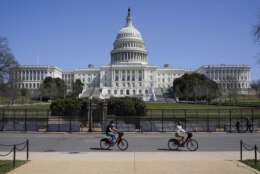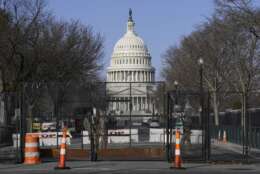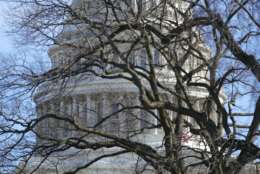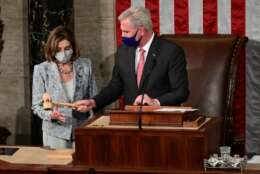Mitchell Miller
-
The Senate is out of session for a couple of weeks. So nobody can filibuster, or not filibuster anyone else.
March 29, 2021 -
When Congress opened the spigots of spending in a bill President Biden signed last week, it used a nozzle to spray the money everywhere, including on the government itself.
March 15, 2021 -
Incomes, employment, economic growth might be on the rise and a variety of vaccines are getting out into the market. But that didn't stop the House from passing a nearly $2 trillion stimulus bill.
March 01, 2021 -
The "new" normal: A third pandemic relief bill and permanent barricades around the Capitol building?
February 16, 2021 -
Congress has a lot of measures in mind for federal agencies and federal employees. But they've also got to get through an impeachment trial and lots of pandemic spending.
February 01, 2021 -
With Congress totally preoccupied with the aftermath of the Capitol riot, and fresh pandemic spending, is there what you might call a normal agenda? For some answers on what to expect near term WTOP Capitol Hill correspondent Mitchell Miller spoke to Federal Drive with Tom Temin.
January 18, 2021 -
The Capitol Building press gallery is stuffed with cubicles belonging to members of the media, including our own WTOP Capitol Hill correspondent Mitchell Miller, who joined Federal Drive with Tom Temin.
January 08, 2021 -
For a brief review of the outgoing Congress and what we might expect from the next, Federal Drive with Tom Temin turned to WTOP Capitol Hill correspondent Mitchell Miller.
January 04, 2021 -
Congress in the last few weeks may have sounded like a broken record, but the calendar will soon knock the needle somewhere.
December 21, 2020 -
WTOP Capitol Hill correspondent Mitchell Miller joined Federal Drive with Tom Temin for the outlook.
December 07, 2020 -
Over on Capitol Hill with the lame duck session has both the current and the future to deal with. The pandemic is returning to a boil, and so are the calls for some sort of relief bill.
November 23, 2020 -
You could conclude that the next administration will belong to Joe Biden. The Senate looks to remain with a slim Republican majority. And a House that's slightly more balanced between the two.
November 09, 2020 -
As we plow toward the election, the Senate will vote on Supreme Court nominee Amy Coney Barrett as members of Congress scramble to get anything done.
October 26, 2020 -
The Senate is almost totally occupied with Amy Coney Barrett, President Trump's nominee to the Supreme Court, but this debate also crowds out other important business in a compressed time period.
October 13, 2020 -
Amid talk of a SCOTUS replacement, the Senate takes up the continuing resolution issue as the last of the sand slips through the hourglass.
September 28, 2020














